In a sweeping national crackdown on illegal activities, the Cuban government has levied a flood of fines on Havana's street vendors, small business owners, micro, small and medium enterprises (MSMEs), with some penalties reaching up to 16,000 Cuban pesos (CUP). This initiative is part of the Second National Exercise for the Prevention and Confrontation of Crime, Corruption, Illegalities, and Social Indiscipline, currently being conducted nationwide under the watchful eye of the Communist Party and the Ministry of the Interior.
The Plaza de la Revolución municipal administration reported that the inspections resulted in over a dozen fines for violations such as unauthorized pricing, selling expired products, and the illicit practice of self-employment. Fines ranged from 5,000 to 16,000 CUP, with some cases involving enforced sales at official prices.
Among the most notable cases were:
- A private business on 19th Street, fined 13,000 CUP for selling chicken at 330 CUP per pound—above the official rate—and bread without displaying prices.
- The MSME Río Luz was fined 8,000 CUP for selling expired rice.
- To' Rico retail outlet received an 8,000 CUP fine for selling malt and pasta at unauthorized prices.
- El Recanto establishment on 17th and 10th was penalized for selling expired goods.
Several pushcart vendors were fined between 5,000 and 8,000 CUP for not displaying prices or selling agricultural products above approved values. The harshest penalties were imposed on unlicensed street vendors, who faced fines up to 16,000 CUP under Decree-Law 91. Additionally, some were fined an extra 8,000 CUP for speculative pricing or failing to display product prices, particularly in the resale of food items like potatoes and cigarettes.
During several of these operations, enforced sales measures were applied, compelling vendors to sell their products at official prices. Authorities emphasized that these actions aim to "maintain order, combat speculative practices, and protect the public from abusive pricing," warning that inspections will persist.
The news sparked debate on social media, with some citizens supporting the need to control speculation, while others criticized the repressive approach toward the private sector and informal workers. Although exact figures on the number of fines or arrests have not been disclosed, the regime's deployment of forces and the publication of results in state media suggest a broader aim: to strengthen state control amid a deep economic crisis and growing public discontent.
Critics argue that the focus on punitive measures is a reflection of the lack of structural solutions and a way to divert attention from diminishing purchasing power and widespread shortages. Meanwhile, small merchants and self-employed workers find themselves increasingly suffocated between informality and repression.
Frequently Asked Questions about Cuba's Crackdown on Illegal Activities
What is the maximum fine imposed on street vendors in Havana?
Street vendors in Havana can face fines of up to 16,000 Cuban pesos.
What is the purpose of the Second National Exercise for the Prevention and Confrontation of Crime?
The initiative aims to maintain order, combat speculative practices, and protect the public from abusive pricing.
How have social media users reacted to the fines?
Reactions on social media are mixed, with some supporting the need for price control and others criticizing the repressive measures against the private sector.
